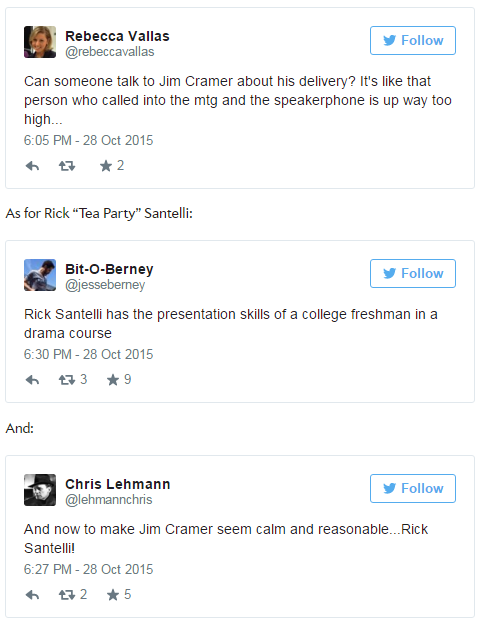
IPFS News Link • Politics: Republican Campaigns
CNBC Was the Biggest Loser of Its Own Debate
• Slate.ComEarlier this week, the New York Times ran a headline claiming "CNBC May Be the Big Winner of the Next Debate." It's a pity someone at the network didn't toss salt over his shoulder after reading it.
To watch CNBC during the day is to stumble into a different reality. Talk is fast and screaming is constant. Businessmen are stars who are rarely subject to tough questioning. No one seems to think it odd if an anchor asks one question and an interview subject answers another. Like in a bad movie, people talk past one another, not at one another. I drove cross-country late last summer, and gave up on listening to CNBC on Sirius after about a half-hour. Without its visuals, the network was literally incoherent.
I say all that as a way of explaining the Republican debate that CNBC hosted Wednesday evening. The main moderators—John Harwood, Becky Quick, and Carl Quintinilla—appeared to be in a different time zone from Jim Cramer and Rick Santelli, who pitched in with a few questions. Although come to think of it, Quintanilla may have been in a different zone from everyone. Were there tough questions? Sure. In fact, there were more than a few. There were hard queries about H-1B visas, and the candidates' tax plans. Quintanilla even managed to push Ben Carson on his involvement with Mannatech, the shady multilevel company whose vitamins and other supplements it allowed sales reps to claim cured autism and cancer.
But mostly CNBC's debate was mess—and to regular CNBC viewers, a familiar one. How bad was it? Straight-ahead moderators John Harwood and Becky Quick seemed to be broadcasting from Planet Face the Nation, lobbing serious policy questions. Meanwhile, the more flamboyant Cramer and Santelli practically competed for overacting honors.
Cramer all but screamed his question about prosecuting GM executives to Chris Christie, maybe to con his audience into thinking he was playing hardball when he was lobbing a softie.

And as for Quintanilla, his performance managed to remind me almost at once that his finest moment as a journalist was when he got an interview with soon-to-be-indicted $8 billion Ponzi schemer Allen Stanford and asked him, "Is it fun being a billionaire?" He opened the debate with this less-than-serious question:
This series of debates is essentially a job interview with the American people. And in any job interview, you know this: You get asked, "what's your biggest weakness? So in 30 seconds, without telling us you try to hard, or that you're a perfectionist, what's your biggest weakness and what are you doing to address it?"
John Kasich went first. He didn't answer the question.
Not long after, Quintanilla allowed Ted Cruz to score major applause by attacking the moderators for pitting the candidates against one another, claiming they had gone easy on Clinton, Sanders, and all the rest during the Democratic debate. No one pointed out that the Democratic show was on CNN, not CNBC. Maybe they were too stunned by the Cruz's use of the word Menshevik in relation to the other team's debate.






























